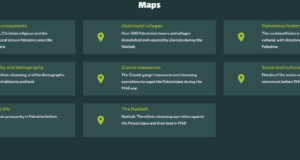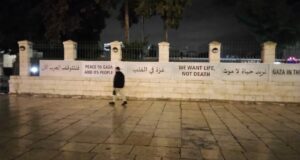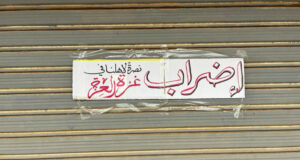by ISM Nablus, December 5th
The checkpoint commonly known as “Sabatash”, named after the Palestinian security forces that used to maintain a presence there, has been closed indefinitely for all civilian traffic bar humanitarian transportation such as ambulances and medical supply deliveries. This turn of events was suddenly announced a little more than two weeks ago to the residents of Asira Ash-Shamalia, located on the far side of the checkpoint from Nablus city.
The checkpoint is located in a sharp bend in the main road to Nablus; a thoroughfare used daily by- and crucial to university students and workers. It has developed from a makeshift checkpoint consisting of a muddy trench and a few cement blocks to a permanent terminal with a watchtower, walls and two vehicle lanes. Palestinians have been humiliated, stripsearched, made to stand in a meter of cold ditch-water, beaten and shot here every day since the beginning of the Al-Aqsa intifada. Although notorious for its extremely violent soldiers, the checkpoint has still been the preferred route for most Palestinians, as walking around over the mountains is even more treacherous. If spotted by Israeli soldiers, one runs the risk of being shot or detained for many hours.
One villager was detained by soldiers a rainy winter day a couple of years ago. He can hardly hold back his tears as he tells the story of how he ventured over the mountains in order to buy warm winter clothes for his son. On his way back, soldiers ambushed him from behind some bushes, very nearly shooting him dead. After making sure that he was not carrying any explosives, the soldiers calmed down and their commander started talking politics for over three hours, all the time in a civil manner. All of a sudden, the commander’s attitude changed and he ordered the man to be handcuffed. The soldiers then proceeded to beat, spit and pee on the man as he lay defenceless on the ground. The commander ordered the Palestinian man to undress, produced a video camera and told the man that he would be let go if he said on tape that he is a dirty Palestinian who does not deserve to live, to breathe oxygen or to drink water.
The man agreed to testify on tape and, shivering in the cold, proclaimed that “I am proud to be Palestinian and to be walking home to my family in my village breathing my air. I was under the impression that you were a civil man, commander, but I am afraid I was mistaken for you have lost your humanity and therefore lost everything.” The commander then attacked him, thrusting the butt of his rifle into the man’s naked stomach. The man was then forced to lie down on the ground with his head ten centimeters away from the chains of the tank. Revving the motor, the commander explained to the man that they will now run him over. The Palestinian man asked for one last favour before he was to be killed – for the soldiers to deliver the warm clothes to his son and wife. The soldiers then took the clothes and burned them in front of the man as he lay naked on the ground.
After more than 12 hours of humiliation, the soldiers pushed the handcuffed man down a steep slope, cutting his skin on thorns and rocks. Nearby villagers rushed out to take care of him as the soldiers left and he eventually returned home, with both arms broken. This is but one horrific story out of many experienced by the citizens of Asira Ash-Shamalia. About one month ago, 25-year old Haithem was shot with live ammunition at close range for daring to protest against the soldiers’ treatment of a group of young women at the checkpoint – forcing them to run their hands tight along their own bodies. He is still in hospital being treated for the wounds sustained that night.
Now, the checkpoint has been closed indefinitely. Instead, the villagers are forced to travel in a 40km arc around the checkpoint to get to Nablus. Flying checkpoints are set up by Israeli military along this road, meaning the journey can take anything from 40 minutes to several hours. Despite contacting various human rights organizations, legal experts and military commanders, the villagers have not been able to find out why the road has been closed.
It could be an incidence of collective punishment due to the village’s successful olive harvest campaign. A committee of ten dedicated villagers spent the autumn months encouraging villagers to tend to their lands, even those close to the nearby military base and to stand their ground in case of confrontation with the military – “just try to have a calm logical conversation with the soldiers. The words will come naturally to you. After all, it is your land!” They also organized the removal of close to one hundred roadblocks scattered within and around the village, so as to allow for the passage of tractors and other heavy equipment needed during the harvest.
Greatly empowered by the committee’s work, the people of Asira Ash-Shamalia have this year harvested olives from land that has lain idle since the beginning of the first intifada. Furthermore, there has been a revival of old harvesting traditions, with young and old congregating in the fields to work, sing and eat together. In the past, a couple of adults from each family used to sneak to their fields and hurriedly pick as many olives as they dare before rushing home – almost as if “stealing” their own olives. This year, the harvest has been an open, joyous event, despite repression in the form of teargas and gunfire from soldiers manning the military base on the mountain Ebal.
The Israeli military have tried all sorts of measures to control the village’s newfound sense of self-determination. In the evenings, they would come and try to grab individual villagers from the olive press factories. After wrestling men to the ground and dragging them out of the building, the soldiers were forced to see themselves defeated as villager after villager struggled to get free and returned to the press. Whatever the reason for the sudden and unexplained closure of Sabatash checkpoint, this will not quench the spirit of resistance and invention in Asira Ash-Shamalia.
 International Solidarity Movement Nonviolence. Justice. Freedom.
International Solidarity Movement Nonviolence. Justice. Freedom.


